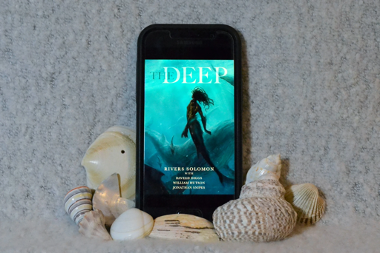
“Their story took one of the most gruesome details of the Atlantic Slave Trade and reframed it. The murder of enslaved women was reimagined as an escape from murderous oppression, and the founding of a utopian civilization.”

Written by Rivers Solomon (they/them), The Deep is a creative collaboration between Solomon and the members of the experimental hip-hop group clipping., made up of Daveed Diggs, William Hutson, and Jonathan Snipes. This novella centers around a species of merpeople called “wajinru,” descendants of the pregnant African women who were thrown overboard by white slave owners during the Atlantic Slave Trade. This book is so powerful and poignant, as it highlights intergenerational trauma, colonial injustices, and white supremacist violence. It captures a culture built from the pain and suffering of black folks and weaves a fascinating story following an important socio-political figure within the wajinru. Yetu, the current Historian of the wajinru, runs from the consuming pain she experiences from the burden of being the sole keeper of generations of her people’s memories, which threaten to swallow her up or kill her. The book features dark themes but is simultaneously filled with light and hope.
As you read the book, reality weighs on you. Yes, Solomon builds a utopian world under the sea, but it’s utopian with an asterisk. It’s a utopia because one person, the Historian, is chosen from every generation to carry the burdens of the entire race so that no one but them has to suffer from the pain of the trauma passed down from the beginning of their conception. It allows everyone but the Historian to live happily, to remain pain-free, and only live with the memories of their day-to-day. Once a year, the Historian gets to temporarily relieve their burden to the rest of the people, only to reabsorb it after a short period of time. It is all a way to protect the people, keeping them ignorant so that they may live in peace. Plainly speaking, the trauma experienced by their ancestors was deemed too difficult for anyone to bear without facing immense suffering; and so, it is thrust upon only one person per generation. But as great as it sounds in theory, the reality is that they are sacrificing one person’s mental and physical well-being for the sake of the whole race. And this is not practical. It does not work. The Deep explores this in an excruciatingly honest way. It is as incredible, unique, and brilliantly written as it is absolutely devastating and heart-wrenching. Rivers Solomon is a master writer.
“You say madness such as mine doesn’t exist, but it would exist in you, too, if you had to experience the ugly things I do all the time.”
The main character, Yetu, is entirely relatable in many aspects. She feels the immense weight of the burden she carries and she reasonably questions the validity and fairness of her duty to her people. Through her musings, she admonishes herself for seeking freedom and convinces herself that she is selfish and treacherous. The guilt weighs on her throughout the book. As a reader processing Yetu’s experience, you begin to truly wonder how it is that no other wajinru has defected before. You can’t help but marvel at Yetu’s bravery and attempt to do better for herself, while simultaneously feeling uncomfortable with the fact that her actions plunged her people into chaos. Rivers Solomon plays this line incredibly well. It’s impossible not to both sympathize, and worry about the correctness of what has happened.
The way the book progresses is fascinating, to say the least. You follow Yetu as she recovers from years of suffering (as well as the physical injuries she has sustained from being lost in the memories and trauma), but you also experience some of the happenings of the past generations of wajinru including the difficult and hard-to-swallow parts. You start to understand why the wajinru are the way that they are, and can respect their reasons while also disagreeing with them. Both aspects of the book are masterfully written so as to keep you invested in both Yetu and the wajinru as a whole.
Yetu meets humans who treat her with compassion and develop deep, caring feelings for her, which are at odds with some of the memories Yetu used to carry about the cruelty that humans are capable of. You see the ocean through the wajinru’s eyes: A beautiful oasis full of a community of creatures that nurture each other and creates life. This book is truly an experience. The ending is beautiful and fitting, if not a little bizarre (but it is so sweet, so it can be forgiven). The characters are unique and multifaceted. And there is a strange karmic element that makes you wish that the wajinru were real if only to have a complicated, but nonetheless beautiful legacy born out of horrific colonial practices.
“You lived. You did what you needed to do to make sure you lived. Our survival honors [sic] ancestors more than any tradition.”
Content warnings: murder; death; trauma; descriptions of slavery from the past; self-harm; attempted suicide; suicidal ideation; PTSD; depictions of blood; discussions of genocide and erasure; cultural and intergenerational trauma; drowning; mention of war.
